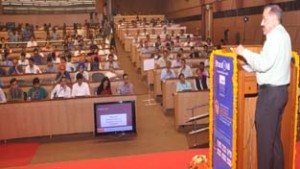Excelsior Correspondent

NEW DELHI, Sept 12: In his inaugural address as chief guest at the two-day National Conclave on “Social Media for Good Governance”, Union Minister of State (Independent Charge) Development of North-Eastern Region (DoNER), MoS PMO, Personnel, Public Grievances, Pensions, Atomic Energy and Space, Dr Jitendra Singh said here today that the rise of social media is a part of a global phenomenon and it is there to stay regardless of all other factors. The question therefore, he said, is not how the social media and governance can impact each other because the two have the capacity to survive even as independent entities without depending on each other. The actual issue is how best and optimally to use the social media so that it can supplement good governance with a citizen-centric goal, he said.
Dr. Jitendra Singh credited Prime Minister Narendra Modi for having brought the process of e-governance into focus and thus offering a cue for public discourse on the link between social media and governance. Both the governance as well as the social media existed even before, but the futuristic prioritization of the present government during the last 15 months has not only facilitated wider public participation in governance through social media but has also instilled in common man the confidence of being an important stakeholder in governance under Modi government. In this context, he cited the example of “Swachh Bharat Abhiyan”, wherein on the advice of PM Modi, the government had invited suggestions for a suitable logo for the campaign as a result of which a young boy felt inspired to suggest a logo, which has now become famous, depicting Mahatma Gandhi’s spectacles with words “Swachh” and “Bharat” on each of the two eye-glasses.
Striking an original note, Dr. Jitendra Singh observed, sometimes he feels that the expression “social media” is a misnomer because the media of the earlier times, even though confined to a few print newspapers, also had a social relevance and was meant for society. But, he added, the present instant options like Twitter and Facebook have not only enhanced social interaction but promoted socializing and hence possibly these options through Net have earned the popular nomenclature of “social media”. Whatever it be, these options have made the media more interactive, as a result of which, a common man living in a remote village also enjoys the privilege to register his opinion or input and, herein precisely, lies the strength of social media of today, he added.
In a democratic Parliamentary system like ours, Dr. Jitendra Singh said, what matters the most is the nature and composition of the political leadership at any given time because it is from the helm of affairs that every other organ of good governance receives its cue for the direction in which to move. Fortunately, he said, the present dispensation under Prime Minister Modi, not only allows absolute freedom to experiment and innovate but is also ready to encourage even revolutionary reforms, which is what provides an opportunity for new tools and new mediums including the social media to participate in the process of governance. As an example, he cited a number of pending cases of pension and service matters which had been resolved online by the Department of Personnel and Training (DOPT) and Department of Administrative Reforms, Pension and Grievances (ARPG).
BJP National General Secretary Muralidhar Rao, President NASSCOM and Former Chairman Telecom Commission R. Chandrashekhar and Union Additional Secretary, Ministry of Communications & IT Aruna Sundararajan also spoke in the inaugural session.

